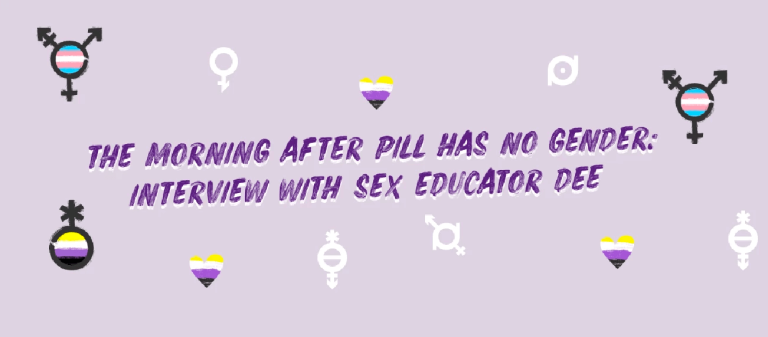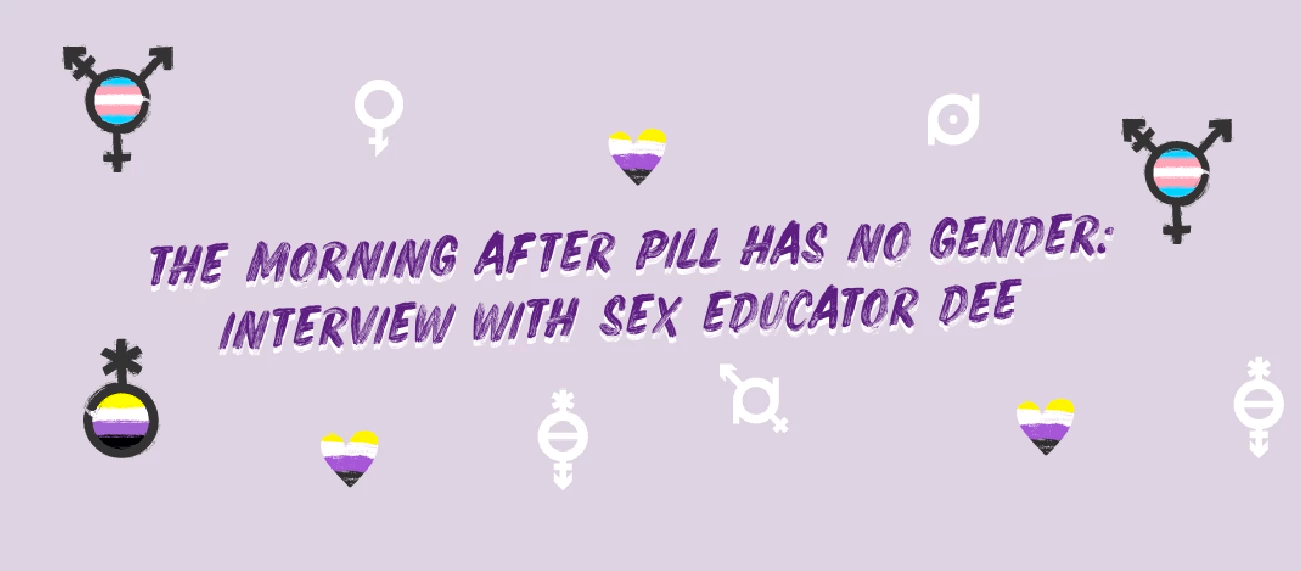Since starting the My Morning After campaign in 2018, we’ve learned a lot about the stigma which still surrounds this medicine. We know it can be embarrassing to go up to a stranger and essentially say: “hey, I had sex!”, especially in a society that is still quite shy about that sort of thing.
Many people who access the morning after pill worry about what assumptions might be made about them. That can be even more difficult if you are gender non conforming. You may be worried that you’ll be misgendered, or have to have a discussion about your gender identity with a stranger. You may fear being turned away, or being judged.
It’s really important that anyone who can get pregnant and wants to access the morning after pill to help prevent unplanned pregnancy is able to do so without difficulty. We had a chat with Dee, a queer sex educator who uses they/she pronouns, about why the morning after pill has no gender.
How would you describe your Instagram account?
It’s an educational page which focuses primarily on LGBTQ+ issues because that’s something that I’m very interested in. It started off as primarily an relationship and sex education (RSE) based page. But as I began to look into my own identity I fell in love with ‘queerifying’ sex education.
What would you like people to know about the difference between sex and gender?
Sex is your biology. It is your genitalia and it is assigned to you at birth by a doctor. Your gender cannot be assigned to you at birth by a doctor because it’s not something you can physically see. Gender is something you feel internally.
It sounds bad when you say it’s in your head, but it’s located in your brain, while your sex is in your genes. Gender has to be explored. It’s something that’s personal and grows over time.
What do you wish people knew about pronouns?
For me, the biggest thing is that pronouns may not seem important to you as a cisgender or heteronormative individual, but to individuals who are gender diverse, non-binary, or trans, pronouns are really, really important to our existence and validity.
How does it feel to be misgendered?
The minute you’re misgendered, those words slice into you. You really notice it. Even when it’s not about pronouns, it could be a very feminine or masculine compliment. You hone in on those words.
It feels like you’re in slow motion. It can push you back a little bit and you take a moment to reevaluate the situation. Has the person accidentally misgendered you? Does the person know? Maybe the person is not well versed in pronouns?
At school, they use titles like ‘Miss’ or ‘Sir’ on an everyday basis. Luckily, I use both pronoun sets, they and she and I don’t have any issue with going by Miss.
But I know that so many other individuals in the same field who don’t go by Miss or Sir. It feels like you just have to let it go, even though we shouldn’t have to.
How can sexual health brands be gender inclusive whilst also being medically accurate?
ellaOne is already very inclusive in terms of the packaging. It’s not pink! It’s purple, which is neutral. This is something that you see happening with a lot of period products these days. They were very pink washed for a long time. Now you have amazing companies that are pushing towards inclusive packaging.
I see a lot of pages, companies and organisations that talk about biological female issues, but they don’t also include the fact that yes, you may be an individual who has “female genitalia” but you may not identify as such, and those people are still valid and still deserve education and access to products that can help them.
It would be lovely to see people who are gender diverse and who have used the morning after pill to share their experiences. Because anyone of any gender identity can use the morning after pill. We have to remember that sex doesn’t equal gender.
There’s probably a large base of trans and non-binary individuals who have used the morning after pill who don’t feel represented. Because they don’t identify as a woman, they feel like they can’t access it.
Is the morning after pill a gendered product?
It doesn’t have to be, but unfortunately it is in the way it’s taught and usually spoken about. Obviously, it’s tied to biological women who can conceive and who are having sex with someone with a penis who can impregnante them, but it is not tied to one gender identity. Because anyone with a uterus who can conceive can use the morning after pill.
What can we do to help normalise and make it easier for gender diverse people to access emergency contraception?
I loved seeing that you can get ellaOne delivered to your house. I think that is a great way of receiving the morning after pill in a discreet manner. You won’t have to walk into a GP or a pharmacy and have to explain things, especially if you’re a trans individual who is a man. You won’t have that awkward moment of the pharmacist or GP looking at you with confusion.
You’re in your own home, you’re in a safe environment. I think being delivered to your house is safe for the individual and it leads to less misgendering. It means that you don’t have to have that discussion about it, you can do it privately. I think that’s a brilliant way of making it inclusive.
It’s also important to continue changing our language about the morning after pill, discussing it and educating in a way that says anyone who can get pregnant can use the morning after pill and there’s no shame in that at all.
What do you hope the future will look like?
I hope it comes to a point where there isn’t this emphasis on being inclusive, because it’s ingrained in us. There is this idea that heteronormative cisgender people are the norm, that’s where the term ‘heteronormative’ comes from. But there will be a day where that phrase is gone, because everyone is ‘normal.’ That’s kind of beautiful.
It’s a big goal. But I think that is, I think that is the future that I hope for not only with sex education with, with everything, I hope that we don’t have to have you know, a marginalised gendered officer or somebody who has to ensure that LGBTQ plus people are represented, I would love for it to just be part of society to be ingrained in who we are.
—
We are constantly learning and adjusting our language to be inclusive of anyone who may choose to take emergency contraception. We know we don’t always get it right, so we are really grateful for sex educators like Dee who are taking the time to raise awareness and boost this conversation. If you have any ideas on how we could improve, please get in touch on Instagram, Twitter or Facebook.
Have you ever taken the morning after pill? What was your experience like? No matter who you are, your story matters to us. Click here to share your #MyMorningAfter story and help end the stigma around the morning after pill.
ellaOne® 30mg film-coated tablet contains ulipristal acetate and is indicated for emergency contraception within 120 hours (5 days) of unprotected sexual intercourse or contraceptive failure.







